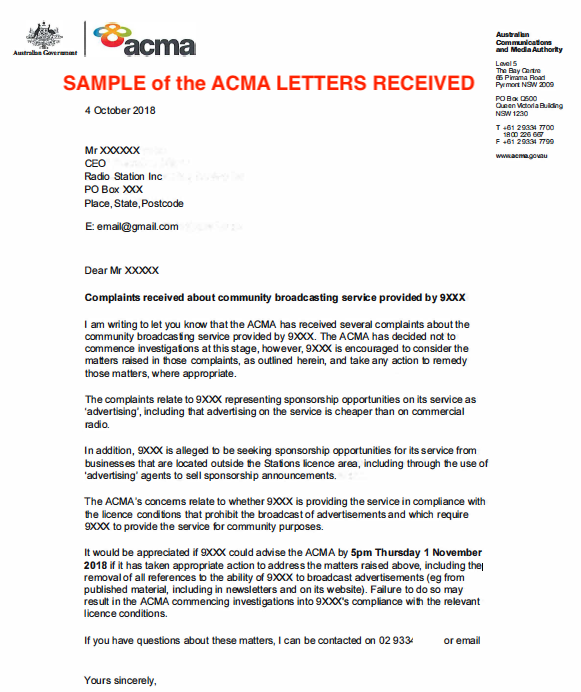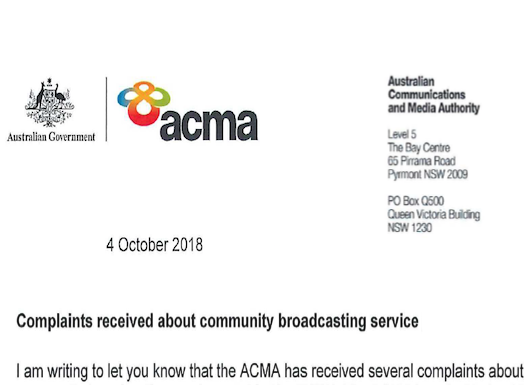Following recent amendments to the Broadcasting Services Act, a number of community stations in four states have received letters from the ACMA alleging “several complaints” about their services, and stating that while no formal investigation will take place, the station should consider matters raised.
The letters, sighted by radioinfo, use similar wording in each case and warn about three concerns: advertising, sponsorship from outside the broadcast area, and use of agencies.
radio.
“In addition, [station name] is alleged to be seeking sponsorship opportunities for its service from businesses that are located outside the Stations licence area, including through the use of ‘advertising’ agents to sell sponsorship announcements.”
The prohibition of advertising on community radio has been in the legislation for the 40 years that the community broadcasting sector has been in existence, has many precedents and is very clear. It is a key distinguisher between the community and commercial sectors. But the other elements are new and stations that have received the letters have been debating the validity of the ACMA’s focus on gaining sponsorship from outside their broadcast area and using agencies.
Stations argue that it is legitimate for them to seek sponsorship from outside their broadcast area and that agencies are legitimate ways to facilitate sponsorship bookings.
We put the questions to an ACMA spokesperson:
Are community stations banned from accepting sponsorship from outside their broadcast areas? Are community stations prohibited from using agents to sell their sponsorship? If so what are the references in the Act or Codes? The spokesperson replied:
• to provide a service for community purposes and
• represent the community interest in their licence area.
But the spokesperson also hinted that issues such as this might become an issue when licences are renewed, saying:
• it is hosted in the licence area; or
• it is produced in the licence area; or
• it relates to the licence area.
radioinfo is seeking a response from the Community Broadcasting Association on these issues.
The Broadcasting Services Act paragraph (section 84), about the allocation of community broadcasting licences used to read:
But it was recently changed to add the following paragraph:
The changes define “local significance” as:
- it is hosted in the licence area of the proposed licence; or
- it is produced in the licence area of the proposed licence; or
- it relates to the licence area of the proposed licence
As part of its government engagement the CBAA raised concerns about the definition of ‘local significance’ at the time the legislation was being considered.
When the legislation was released the explanatory memorandum that came with the amendments said
This part of the legislation wants “material of local significance” to be a big consideration in licence renewals. Material of local significance would be defined as “material that is produced in, hosted in, or relates to, the licence area of the proposed licence” when renewing licences, according to the explanatory memorandum to the Bill.
It now appears that this new localism around programming may also include sponsorship and from where it is sourced.
Some community stations that have used the word “advertising” to explain sponsorship have been advised to remove any mention of “advertising” not only from anything they broadcast, but from written sales material including brochures and business cards and even from their web sites.
Stations spread across 4 states (Qld, WA, NSW, and NT) that have received these letters from the ACMA have told radioinfo that they have a number of concerns.
They say the letter seems to imply that stations shouldn’t take sponsorship from anyone outside their broadcast area. For example, that may not allow a station to take sponsorship from a hotel or holiday apartments 400 km away. Cruise company or airlines may not be able to take out sponsorship because the ship of plane departs from somewhere outside the area. It may also mean that they are unable to take sponsorship from a local business because that business has a head office outside the broadcast area.
The stations argue that this information is of interest to their local community and that it should be allowable, and even encouraged, under the act.
The stations concerned are currently trying to get clarification from the ACMA and have until the beginning of November to answer the concerns the ACMA have raised.
A mock up of the ACMA letter is below. The CBAA’s response is in our follow up report.


